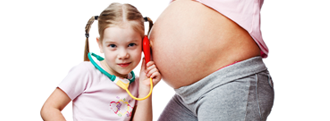Your Child at 12 Months
Pediatric Development Guide from Westside Pediatrics
The board-certified pediatricians at Westside Pediatrics have provided this pediatric development guide to help educate parents on some of the amazing things their child can do at this age and tips around care including promoting a healthy diet and the use of transitional objects. Call (585) 247-5400 to schedule an appointment at our pediatric office in Rochester, NY.
Download PDF Version
WHAT YOUR BABY CAN DO
At this age your baby can probably:
Move around…
Some babies can walk, but others will not be ready for a few more months…
Say “MaMa” or “DaDa”…
Say “No”…
Repeat familiar sounds…
Use a cup fairly well…
Babies this age need to do things on their own, as well as be taken care of. You may see quick changes from cooperation to “stubbornness”.
What can you do with your 12 month old baby
Don’t push your child to walk.
He will walk when he’s ready. Talk to your baby. Try to understand his words and answer him. Name things as you give them to him. For instances, if he asks for his “bah-boo”, give it to him and say, “Here is your bottle.” Give your child plenty of love and hugs. Encourage him as he learns to walk and talk.
Safety
Teach Your Child About Dangers
Around this age, children start to say a few words. Now is the time to start teaching them about danger. Words like “hot” and “ouch” are good danger words. Let your child touch some hot (but not too hot) water and tell her “hot”. If she should accidentally get burned be sure to tell her “hot”. Soon she will learn that “hot” things are dangerous. You can even tell her that electric cords or sockets are “hot”. It is important that your child learns what things are dangerous. Having a word for these dangers will help her learn to avoid them.
Good habits, healthy kids
Habits can be very hard to change. You may not be willing to give up soda pop or potato chips. But it is important to get your child into good eating habits from the very start. Help your child grow up healthy by following these tips:
- Give crackers or fruit instead of chips
- Don’t fry foods; try baking or broiling instead
- Give fruit instead of sugary desserts like cake or ice cream
- Limit sugar and salt
Helping your child get into good eating habits now will help her for her whole life! By learning to eat right, she will be much less likely to have high blood pressure, heart disease and diabetes. Give your child the advantage!
Feeding facts
Weaning from the bottle
If you haven’t already, now is the time to start weaning your baby from his bottle. Bottles are not good for your baby after his first birthday because they may damage his teeth, both those already in and those yet to come. They can interfere with good eating habits by making him not hungry at mealtimes and filling him up with fluids instead of healthy foods. They also may cause ear infections, if propped. Finally they can interfere with language development (a baby with a bottle or pacifier in his mouth can’t talk very well and may be less likely to try).
To wean your baby, give him his milk or water in a cup. Show him how to use a cup and encourage him to imitate you. If he insists on the bottle give it to him, but limit it to mealtimes and gradually cut back until he no longer needs it. Never let your baby carry the bottle around with him as he plays, or take it to bed with him at night.
What should I feed my toddler
Every mom wants her child to grow up strong and healthy. To make sure this happens, you need to feed him a healthy balanced diet starting the day he is born. But what is a healthy balanced diet? The guidelines below will tell you what your child should be getting every day. Check and see if you are meeting these guidelines.
- Protein—4 servings every day. Milk, yogurt, cheese, eggs, meat, chicken, turkey, fish, protein-rich pasta.
- Green leafy vegetables or yellow vegetables or yellow fruits—at least 2 servings every day. Apricots, cantaloupe, mango, nectarine, peach, plantain, asparagus, peas, broccoli, cooked greens, carrots, pumpkin puree, sweet potato, tomato.
- Whole grains—4-5 servings every day. Wholegrain bread, bagel, English muffin, pasta, muffin, crackers, rice, whole-grain cereal, chick peas, lentils.
- Iron-rich foods—some every day. Whole grains, dried peas or beans, dried fruit (raisins, dried apricots), liver, spinach, iron-fortified cereal.
- Fluids—4-6 cups every day. Water or milk. 16-24 oz. milk per day—may supplement with water and only occasionally with juice. Be careful not to offer juice on a regular basis—it tastes sweet and your child may learn to prefer it over more healthy foods. A toddler serving is not the same as an adult serving (ie. One slice of bread for an adult versus ½ – ½ slice for a toddler).
Things you may be worried about at 12 months old
Ear Infections
Ear infections are common in children. Your child may already have had one or several. Signs of an ear infection include:
- Being irritable
- Pulling at his ears
- Waking or crying at night
- Having a temperature.
Your child’s pediatrician may prescribe antibiotic medicine for your child’s earache. He will also schedule a follow up visit to check the ears again. It is important that you go to the follow-up!
If an ear infection goes on for a long time, or if your child has repeated ear infections, he may not be hearing as well. If he doesn’t hear well, he may have a hard time learning to talk. In a follow-up visit, the pediatrician can make sure the ear infection is all cleared up.
Transitional objects
“Transitional objects” are the blankets or soft toys that your child uses to help make the emotional transition from dependence to independence. When he’s tired it will help him get to sleep.
When he’s frightened or upset, it will comfort him. It also reminds him of home when he’s in a strange place. There is no reason to keep your child from using one even at age 5 or 6. It is so helpful; many parents help their child choose an object that he uses every night when he goes to bed.
“Transitional objects” work partly because they just feel good! They’re soft, cuddly and nice to touch. They always remind your child of the comfort and security of his own room.
Some parents find that two identical “transitional objects” make things easier. This way you can wash one while the other is being used. If one gets forgotten at a relative’s house or at daycare, having a duplicate will prevent a tantrum. Start rotating the two objects early on so both get equally worn or else your child will refuse the one which is too new. If your child uses a security blanket you can cut it in half to get two identical “transitional objects”. Most young children won’t even notice the change.
Don’t worry—your child will gradually give up his “transitional object” as he matures and finds other ways to cope with stress.
How should I discipline my 12 month old child
Discipline is probably the hardest part about being a parent. Even at a very young age, your child will start to test his limits. He is probably not trying to be bad, and it is important that you guide him firmly but gently so that he learns what behavior is okay and what is not. Here are some tips to follow as you start to discipline your child.
Remember, it is the action or behavior and not the child that is bad. When you say “You’re so bad” or “You make me so angry”, you make your child feel like he is no good. Instead, say something like, “It makes me angry when you slam the door”. This way your child will learn which behaviors are good or bad and still feel good about himself.
Offer alternatives
If you tell him “No” all the time, your child may feel like he can’t do anything. Instead, try offering alternatives. For example, maybe you don’t like it when he gets into your purse. The next time this happens, instead of saying “No, you can’t play with my purse”, say “No, you can’t play with my purse but you can play with this ball”, and give him a ball to play with.
Give attention to good behavior, not bad behavior. Children will do whatever brings them the most attention, even if the attention is not praise. If you scold or yell at your child when she acts badly and don’t do anything when she is good, she will act badly to get your attention. Instead of scolding, try ignoring her bad behavior (it’s hard!) and praise her for good behavior.
Be Consistent
Your discipline is helping your child learn what behavior is okay and what is not. It is important that you keep the rules the same. If you tell your child that it is not okay to slam the door one day and don’t enforce it the next, it will be hard for her to learn that it is not okay.
Be Patient
Discipline is a long process.
Helping your 12 month old child learn
Read to him! Most of us want our children to grow up liking school and wanting to learn. There are things you can do to help your child like to learn. One of the best ways is by reading to him. You might wonder what an infant can get out of listening to a story. He can get a lot! If you sit down with a picture book and point to and name things in it, he will enjoy the special time with you and will begin to see reading as fun. The more he hears your voice, the more he will imitate your sounds, and the more interested he will become in communicating with you. Eventually, he will understand your words, and soon he will be saying them himself.
Toddlers also benefit greatly from being read to. They are eager to learn and often, if books are available, they will bring them to you. Toddlers are often very active, and sometimes unwilling to nap. Reading can settle them down so that they can rest, including a story or two in the bedtime routine which often eases bedtime problems. When reading with your child, he will probably enjoy asking questions about the stories, or hearing your explanations as you go along. Toddlers like picture books—sometimes they can look at these alone which gives you a chance to do something else.
Taking time to read to him can be fun for both of you and is one of the most valuable gifts you can ever give your child!
STOP!
Are you so angry you’re about to hit your child? Everyone gets angry sometimes, and that’s okay, but it’s never okay to take your anger out on your child. Next time you are so angry you want to hit him, STOP! Try one of these instead:
- take a few deep breaths
- count to 10 or 20
- hit a pillow
- call a friend
- take a walk
- sit down and listen to some music
Once you feel calmer, you might want to tell your child why you were angry. But remember, hugs are better than hits.
POISON CONTROL CENTER
1-800-222-1222
COMING ATTRACTIONS
Before his next checkup, your child may:
Walk alone (if he’s not already)…
Crawl up stairs…
Understand commands…
Say 3-5 words…
Scribble…
Help turn pages of a book…
Point to appropriate body parts…
Take time with your child to read to him. And give him plenty of love and affection!
Schedule an Appointment
If you have more questions regarding pediatric development milestones or your child’s development, call our pediatric clinic in Rochester, NY at (585) 247-5400 to request an appointment with one of our exceptional pediatricians.




